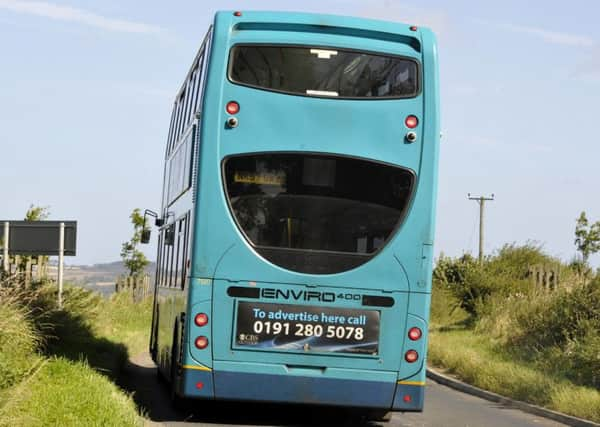GP Taylor: State must step in to give rural areas transport


Having no car, I planned a family trip by rail to Grosmont. That was until I found out the price. What would have cost me £1.60p in fuel for my car was going to hit my wallet for over £20. The journey would have been 6.8 miles. Instead, I took the bus to Sainsbury’s and did my shopping.
What this highlighted to me was the cost of rural transport. With a Government desperate to get us out of our cars and onto the bus or train, how can this happen when the price of community transport is so high?
Advertisement
Hide AdAdvertisement
Hide AdThe issue is that local and national government do not take rural transport seriously. Unless you live in an isolated area, you have little understanding of what life can be like, not just at the end of the line, but where the line has never gone. Sometimes, a bus only happens once a day and trains are non-existent. People living in rural areas are forced to use a car to do things that town dwellers take for granted. Those without a car are doomed to solitude.
Country folk were better connected 100 years ago than they are today. The sweeping cuts of Beeching brought about a grand isolation of much of rural Yorkshire. Over 2,000 stations and 5,000 miles of track were lost nationally and nothing was done to replace the services.
Successive governments have shirked their responsibility for rural transport. The great free enterprise sell off brought about the end of reliable rural transport. It is quite understandable that when buses are being run for a profit, companies will be reluctant to provide a service for little used routes. They will cherry pick the profitable services and neglect those that don’t pay.
Advertisement
Hide AdAdvertisement
Hide AdAccording to the House of Commons Transport Committee, the “extensive” cuts that have happened already to rural bus services mean that people cannot find jobs, travel to school or college – or even access health services. Over 70 per cent of local authorities have moved rapidly to reduce funding for supported bus services, forcing most operators to withdraw services or push up fares.
The impact in the dramatic cuts to rural bus routes is severely affecting families with children. Many people in the Dales, Wolds and Moors live further than two miles from their nearest school. Historically they were granted free transport, but even this looks like it will soon be under threat.
Many people do not have a choice where they live. Housing associations are known to offer rural housing to families in isolated areas. I heard recently of a family in Scarborough offered a house in Hinderwell. The nearest shopping centre is Saltburn and the only public transport is the bus – the railway link was ripped up years ago. A journey that wouldn’t daunt anyone with a car, but with a child, pram and shopping bags, public transport can be a nightmare. It is estimated that one in four people do not have access to a car.
Advertisement
Hide AdAdvertisement
Hide AdWhat’s needed is for local and national government to take the rural transport crisis seriously. No longer can they blame each other for cuts to services. Reliance on private operators isn’t working. Routes run for profit have to be replaced with a nationalised state operated alternative.
We can no longer rely on voluntary services, or the generous sponsorship of businesses such as Harrogate Spring Water, to sponsor the Sunday service of the No 24 bus.
Old railway track beds have to be relaid with new rails, where eco friendly electric hybrid trains can once again open up the countryside for tourist and local alike. Investment has to be made to get people out of cars and back on trains and buses to keep them connected to health and education services.
It is not acceptable that people living in rural areas should miss out on employment prospects, education or health care because of a lack of transport. Private bus and train companies should be made to guarantee a suitable service over less profitable routes.
Advertisement
Hide AdAdvertisement
Hide AdArriva had proved this can be done with the X93 service from Middlesbrough to Scarborough. It acts as a local bus in the towns, and a vital link in the countryside, as it makes its way via Whitby and Robin Hood’s Bay.
This kind of service should be spread out across the county to make the rural way of life less isolated, making a journey into our beautiful countryside cheaper and easier.
GP Taylor is a writer and broadcaster from North Yorkshire.